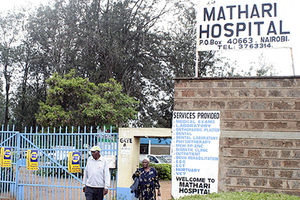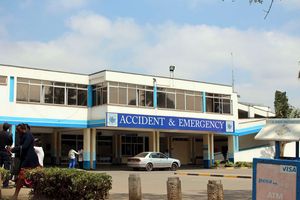Battling TB, HIV and a mental illness: Should this man be in Mathari Hospital or prison?

Nairobi Remand Prison, where Samuel Lesiyampe was detained for nine months.
What you need to know:
- The distressing plight of a patient battling three different serious health conditions at the same time highlights the dire consequences of systemic neglect of inmates wasting away behind bars—deprived of medicine, proper care, and basic dignity, say experts.
A year ago, Samuel Lesiyampe (name changed to protect his identity), a mentally ill man living with HIV and tuberculosis, was arrested and charged with causing a disturbance.”
Samuel, 39, was prosecuted, released on a cash bail of Sh20,000, and ordered to appear in court for subsequent mentions of the case.
An official medical report on the accused done on March 21 by Mr Phillip Kalomut, the clinical officer at Nairobi Remand Prison Health Center, confirms that the accused has TB and HIV, apart from battling schizophrenia.
His sister, Soipan*, bailed him out. She recalls pleading with the arresting officers, explaining that Samuel was mentally unwell and needed medical attention, not incarceration. Her words, however, fell on deaf ears.
Despite his condition, Samuel honoured his court summons faithfully, three times. But each time he appeared in court, proceedings stalled because police had not presented his file. Confused and overwhelmed, Samuel couldn’t understand why he had to keep showing up, or even what causing a disturbance meant.
By the fourth mention, drained and deteriorating from his illnesses, conditions that require consistent medication, food, and rest—he failed to appear in court. That’s when things took an ugly turn.
Acting on fresh court orders, police officers raided his home, dragged him from his bed, and threw him into Nairobi Remand Prison in Industrial Area for failing to appear in court, despite his fragile state.
“My uncle, who is also the complainant, called me and said he would have my brother arrested,” Soipan recalls, tears filling her eyes. “But he told me to stay out of it and let him rot in jail.”
Samuel's health status
She says the uncle is fully aware of Samuel’s health status, his HIV diagnosis, his struggle with TB, and his dependency on medication that requires proper nutrition. “He knows my brother’s condition. He knows he needs food to survive.”
Soon after, Soipan learned that police had transferred Samuel from Ewaso Kedong to Ngong Police Station, where they processed a formal charge sheet.
“Creating disturbance in a manner likely to cause a breach of peace,” reads the official charge dated February 7, 2024, citing Section 95(1)(b) of the Penal Code. The police case number is 117/15/2024, logged under OB number 4/7/2/2024.
By the time Soipan arrived at the police station to plead again for her brother’s release, her uncle had stopped answering her calls.
Last month at Ngong Law Courts, his case was number 17 on a crowded cause list. Senior Principal Magistrate Charles Kutwa had a packed schedule: nine mentions, a pre-trial conference, eight hearings, and one sentencing.
But for Soipan, the only case that mattered was her brother’s, who had been in detention for nine months.
“I explained to the police during the first arrest that he was mentally unwell, but they didn’t care,” she says. “No one has even considered what it means for a man like him to be imprisoned, denied proper food or treatment.”
Soipan sat in court, her breath caught in her throat, waiting for a ruling that could mean freedom or further suffering for her only brother.
“The above referenced is our TB patient who was diagnosed with pulmonary tuberculosis on 10/02/2025, is a known HIV positive patient on ARVs and has been noted to have mental health illness(schizophrenia), the coexistence of these conditions necessitates careful management to ensure both effective treatment and good outcome,” stated Mr Kalomut in his findings to the court.
“The patient is being supported at the prison health facility and is scheduled for review by a psychiatrist at Mbagathi County Hospital, but it’s good to note that currently we are experiencing challenges due to ongoing doctors’ industrial action at Mbagathi Hospital.
“Due to the co-existence of the three medical conditions, he is a patient who requires regular follow-up appointments to monitor both TB/HIV disease and mental health; hence requires a multidisciplinary approach with additional integrated support mechanisms such as robust family support and a coordinated care strategy, which is very vital for optimising patient health outcomes,” the clinical officer told the court while urging it to assist the patient.
To Soipan and Samuel’s relief, the senior principal magistrate dismissed the case.
“It is hereby ordered that the case against the accused person is withdrawn under section 87 (a) of the Criminal Procedure Code, that the person is hereby discharged unless otherwise lawfully held. Given under my hand and seal of the honourable court on this April 9, 2025,” the principal magistrate ruled while further disclosing that the complainant had moved to South Africa and was no longer interested in the matter.
Despite the outcome, Soipan wants to know whether Kenya’s law enforcement and Judiciary system can determine whether someone is mentally fit to stand trial before being charged by police.
Margaret Nyambura, a health lawyer at Kenya Legal and Ethical Issues Network on HIV and AIDS (Kelin), said: “Yes. Kenya’s law enforcement and Judiciary system can determine whether someone is mentally fit to stand trial before being charged by police. However, it seems to be a preserve of suspects of murder; it is a standard procedure for murder. Unless you want to use murder as a defence - situations where the law allows for the taking of a life, typically in self-defence, defence of others, or in the execution of official duties. Examples include a person killing an attacker in self-defence, a police officer shooting a fleeing felon to prevent harm, or a soldier killing an enemy in wartime- then your defence lawyer raises it before the court,” she explained in an interview with Nation while pointing out that first Ngong Police officers violated the law by detaining the accused for weeks before producing him in court.
“Every person should be brought before a court as soon as reasonably possible, usually 24 hours after being arrested. Detaining a person for more than 24 hours is a violation of their right as an arrested person under Article 49 of the Constitution of Kenya, 2010,” she said.
“However, Samuel should not have been remanded in custody since the term of imprisonment for the charge he is accused with is punishable by imprisonment for not more than six months. {Article 49 (2)}.”
In an interview with Nation, Mr Samuel Kinyanjui, the executive director at AIDS Healthcare Foundation (AHF), said that Kenya’s prisons are grim places for human beings.
“For the sick, their odds are close to mortality. The distressing plight of a patient battling three different serious health conditions at the same time highlights the dire consequences of systemic neglect of inmates wasting away behind bars—deprived of medicine, proper care, and basic dignity,” he said.
“AHF Kenya will not stand idly by. We are taking decisive action and we will offer Samuel immediate treatment because no one should be denied life-saving, mental health, HIV and TB care.
“We implore the Ministry of Health to act because prisons cannot become dumping grounds for the sick,” Mr Kinyanjui told Nation while further disclosing that AHF will press for a steady supply of HIV and TB drugs to correctional facilities, ensuring no inmate suffers such neglect again.
“This is more than a single case—it is a test of Kenya’s commitment to human dignity and public health, and we remain committed to ensuring that no one is left behind in HIV and TB care.”


